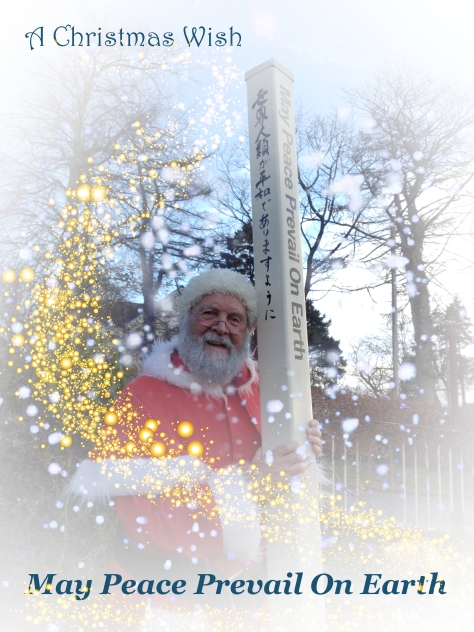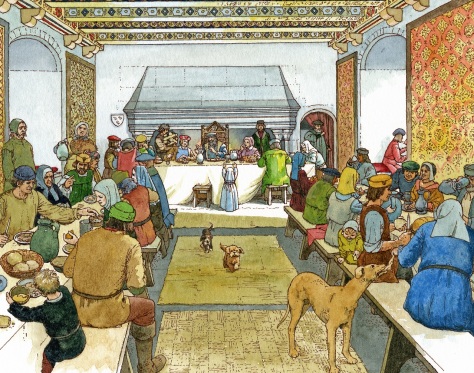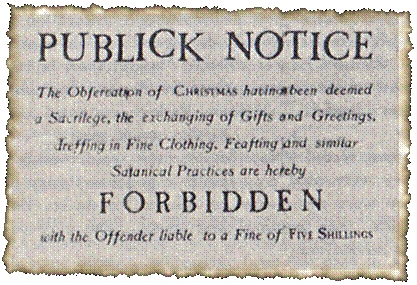
A shout-out to my peace pals!
Merry Christmas! Or Happy Holidays! Or Gledelig Jul! Or Secular Solstice! Or happy Hannukah, lovely Lohri, kwazy Kwanzaa, swinging Saturnalia, dandy Dōngzhì, or whatever dedication to that prehistoric practise of warding away the darkest winter nights with warmth, fire, food, and cheer. Such observations transcend tradition, region, nationality, even continents, as the Longest Night is something that affects every creature on earth, and has done for hundreds of millions of years.
Christmas is the most visible iteration of this primordial thing, and most Christian countries observe it. Some, such as Orthodox countries, celebrate it slightly later, in January, but the general idea was still there. Generally speaking, if a nation’s primary faith was Christianity, then you celebrated Christmas.
Except, there was one country where every winter was without Christmas…

A possible reconstruction of a Craigmillar Christmas feast, circa 1500s?
Scotland was a normal Christian country during the Middle Ages – until the Reformation. Calvinism is, to put it bluntly, a rather severe denomination of Christianity founded on five points regarding predestination and election – the idea that an individual will be going to Heaven or to Hell regardless of what they do in this life. I’ve seen many criticisms from ex-Catholics over the years, but they are nothing compared to what ex-Calvinists come out with – heck, it’s shocking how easily you could make a Lovecraftian cosmic horror story featuring the God of Calvinism without changing a thing. Scottish Calvinism’s been called “a dark, repressive force,” and given the systematic destruction of literature, art, icons, relics, anything that could be connected to “superstition” or “paganism,” along with the restrictions placed on popular freedoms, and especially women, it’s easy to see why: for all the undoubted positives Calvinism inspired through education reform and influence on the Scottish Enlightenment, it has to be balanced against some of the most brutal self-inflicted oppression and intolerance to ever blight our nation’s history.
So, in 1573, the Church of Scotland abolished “all days that hereto have been kept holy except the Sabbath day, such as Yule day, saints’ days and such others”; that very year, 14 Aberdonian women were gravely admonished for “playing, dancing and singing filthy(!) carols on Yule day”; in 1583, the Kirk forbade bakers indulging in the sinful preparation of Yule bread and mince pies, demanding that any transgressions or even requests be reported immediately. Punishment for sinners ranged from repentance & vigorous admonishment on the Black Stool – humiliating and shameful, no doubt, but at least they weren’t hanged or burned at the stake – to excommunication. Christmas – indeed, any celebration deemed insufficiently sombre and dignified – was suppressed by the Kirk.
Things only got worse under Oliver Cromwell. The so-called Lord Protector, a man who is second only to Edward Longshanks as a man “beloved to the English, despised by the Irish, Welsh, & Scots,” enacted a series of puritan restrictions on holidays deemed to be decadent, sinful, and – most terrible of all – “popish.” On 2nd June 1640, the Scottish Parliament put forward a bill effectively banning Christmas:
Act 7 Act dischairging the Yule vacance, appointing the session to sit doun the first of November and ryse the last of Februar, and to sit doune the first of June and ryise the last of Julii
The estatis of parliament, presentlie conveind by his majesties speciall authoritie, wnderstanding that the kirke within this kingdome is now purged of all superstitious observatione of dayes, and heirwith also considering that the keiping of the Yule vacance heath not onlie relatione to that superstitione and may serve to keepe the same in memorie, but also that the keeping of the said Yule vacance heath interrupted the course of justice in this kingdome to the hinderance and heavie prejudice of the leiges thairof, thairfor the saidis estatis have dischairged and simply dischairges the foirsaid Yule vacance and all observation thairof in tymecomeing, and rescindis and annullis all acts, statutis and warrandis and ordinances whatsoevir granted at any tyme heirtofoir for keiping of the said Yule vacance, with all custome of observatione thairof, and findis and declaires the samene to be extinct, voyd and of no force nor effect in tymecomeing. And ordeanes the court and sessione of the colledge of justice and senatouris and memberis thairof to conveene and sit for the administratione of justice without ony interruptione by the foirsaid Yule vacance from the first day of November to the last of Februarie thairefter inclusive yeirlie, and ordeanes the said senatouris and remanent memberis of the said colledge of justice to ryise the said last day of February and to conveene and sit doune againe for administratione of justice to the leiges the first day of June yeirlie, and to ryise the last day of Julii nixt thaireftir inclusive. And also ordeanes the whole remanent judges of inferiour courtis within the kingdome to proceed in thair administratione of justice within thair severall jurisdictiones without any respect to the said Yule vacance and without any interruptione or vacatione by the same Yule vacance, notwithstanding of ony bygone custome of observatione of the said Yule vacance, sieing the samene is now dischairged in maner foirsaid.
So Christmas became just another one of the many things ruined by Presbyterians. (I kid, some of my best friends are Presbyterians!) The English Parliament enacted a similar law, although the people of England were fairly defiant. The law was repealed after a few decades in both Parliaments, only ending with the Union of Parliaments, where an act repealing the Christmas Ban came about in 1712. But while Christmas eventually re-emerged in 19th Century England thanks to Prince Albert, Scotland was still dominated by the austere Kirk, where all these carols and trees and feasts seemed a bit too pagan for their liking.

This was technically the work of Puritans in Boston, but still, DAMN PRESBYTERIANS
Even into the 20th Century, the grip of the Reformation yet resisted the coming of St. Nicholas:
Looking back to 1919 and his boyhood in rural Perthshire, a man recalled that, although the children might get fruit in their stockings, `We didn’t have a holiday on Christmas day, we went to school. It felt quite normal because work was going on in the farms and in the village; shops were working and, aye, the mills were working`. A woman recalled that `My father was a very strict Presbyterian and New Year was the only time you could hang your stocking. Christmas was the time to sing carols and go to church. No Christmas dinner, no Christmas pudding, it was like every other day of the week`, while another man remembered asking his Edinburgh grandmother why they did not celebrate Christmas like his friends, only to be told `We’re no heathens, laddie`, meaning Catholics or Sassanachs or both. This man felt he had discovered Christmas when serving in Italy during the Second World War and remarked `It was great – my granny was wrong!` (7).
After the war films like `It’s a Wonderful Life` and early television programmes showing Christmas jollity `down south` re-enforced the feel-good factor and change came fast. In 1958 Christmas became a public holiday in Scotland but this was apparently under common law and granting it seems to have been a matter for individual local authorities or companies (8) When it was introduced by Dunfermline Town Council in 1958, the building tradesmen working for Dunfermline Council did not even want it as it meant sacrificing a day from their three day New Year break. But the Council pointed out that most men wanted the day off and Corporation tenants did not want tradesmen working in their houses on Christmas Day (9). Having Christmas Day off was still noteworthy and the Aberdeen Evening Express for December 24th 1959 reported that `It will be almost like a Sunday at the commercial docks tomorrow. For the first time dockers and shipbrokers will be on holiday. It has been decided to fall in line with other ports and recognise Christmas Day as a holiday. Work will carry on as usual at the fish market which will be closed for two days at New Year, but most firms connected with the fishing industry will also try to finish early`. On December 25th 1959 under the heading `A holiday for 100,000 – Christmas break in Glasgow` The Scotsman observed `All shipyards and most engineering works in Clydeside and the Paisley thread mills will be recognising Christmas Day as a holiday` and a spokesman for John Brown stated that the decision had been made last year but this was the first time it would come into operation`.
Where Christmas Day was still not a holiday, workers increasingly took it off, sometimes sacrificing a day of their annual leave to do so. In 1968 newsagents and booksellers led petitions for change and in 1970 the Scottish MP Tam Dalyell promoted the cause in Parliament, declaring that `as a point of principle if not of belief, no-one in Scotland now wants to work on Christmas Day` (10). Christmas Day, although already a public holiday, was not officially a bank holiday but in 1971 the Banking and Financial Dealings Act regulated the system making Boxing Day an additional bank holiday in Scotland and New Year’s Day for the rest of Britain. The Scots like the English now had a two-day break at Christmas (10).
Think on it: for almost 400 years, Scotland was a Christian nation without a Christmas: only Hogmanay, a holiday in its own right with a very different tradition, was suffered under the watchful aegis of the Early Modern Kirk. That’s a lot of Winters without Christmas. And, contrary to popular memory, it wasn’t because Christmas just wasn’t “done” in Scotland – it was actively, aggressively, and consistently stamped out by the same intolerant zealots who marginalised women and put hundreds to the death. Indeed, the very name used by those earlier Scots – Yule – shows that far from being a British Empire relic or a modern cynical American import, Christmas in some form or another has been celebrated in Scotland for far longer.
And it’s easy to see why Christmas has been so eagerly embraced outside the dour, thrawn Scottish Presbyterian stereotypes that live among us. In a time of cold winds, dark nights, and frosty mornings, where families stick to their own homes sheltered from the elements, when precious resources are used to keep the frost and the chill out, it can be difficult to find warmth, light, and optimism. That’s why so many celebrations around the world have solstice festivals of some type or another – it’s ancient knowledge. We have feasts to ensure that the food is distributed in such a way that everyone gets something, with any leftovers kept rather than wasted. We have roaring fires, bright lights and shiny decorations to keep warm and stave off the seasonal depression that long nights bring. We sing songs and visit our neighbours and families to maintain our social bonds through unsociable weather, and to ensure that nobody has frozen to death in the winter. One can only conjecture why anyone would want to suppress such vital community and commonality.
For now, we have our pick of ways to get through the winter – Christmas, Yule, Solstice, whatever name you give it. Just spend it the way our ancestors did – to keep our lights burning through the darkness, until the days grow long and the sun warms our souls again.

Merry Mid winter Al! I hope you have a wonderful time and that 2019 is a more positive year for all.
And to you and yours, Neil!
Best Yuletide wishes to you Al. My girlfriend and I will be celebrating the midwinter in our own way but however you choose to do so, enjoy it and damn those Calvinist and Puritan miserablists!
The Keogh Family Christmas will continue as it has for many years: big huge extended family gathering at the big house. Hope you & your lady have a lovely time!